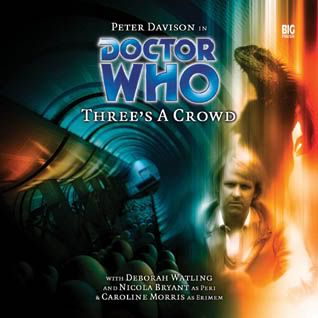
Written by Colin Brake and directed by Gary Russell
Polarity Rating: 3.5 out of 5
After listening to this story, I really have to admit that there was nothing particularly extraordinary or original about it. There's a stranded colony of earthlings, a lot of people getting separated and running up and down corridors, and elements of the story seem to have lifted directly from films like Alien and The Island. All that being said, I still have to admit that it has everything that a halfway decent Doctor Who story has, and I have to laud it on that fact alone, as so many of the Big Finish stories seem to try to do something new and innovative and fall flat on their face (Minuet from Hell comes to mind).
The setting is space station Earth Colony Phoenix, stranded in space and cut off from the home planet, still attempting to terraform the unnamed planet below. The station itself is apparently huge, but houses a minimal number of colonists, and all of them are forced to live in solitary living quarters, never mingling with more than one other colonist at a time. The colony seems more like a prison ship, with the colonists suffering from severe agoraphobia (thus the title). Earth Colony Phoenix is headed by a woman named Auntie (perhaps hearkening back to Mother from Alien?), and she is played with steely coolness by Deborah Watling, whom most of us will know as Victoria during the Second Doctor's era. Ms. Watling has changed quite a bit over the years, and when I saw her hosting one the documentaries on missing episodes as part of the Lost in Time boxed set, I was taken aback at how stoic and somehow cruel she seemed, not unlike a poor man's Anne Robinson.
But I digress. The Doctor and his companions arrive as usual (with Erimem still feeling a bit of angst left over from their last adventure), and we learn that, unbeknownst to most of the colonists, Space Station Phoenix has been infested by a lizard-like alien race called the Khelllian (three L's, that's not a misspelling). The infestation becomes apparent when the TARDIS crew comes across a room filled with large slimy eggs; look closely at the CD cover art and you can see them. Again, inspiration from Alien looms.
I will not tell you what the Khelllian are up to and why they are being aided by Auntie, but the cliffhanger at the conclusion of the second episode is spine tingling; I really didn't see that one coming! There are three other colonists we meet: Bellip, Laroq, and Vidler, and they're pretty much indistinguishable except for the fact that Bellip is a high-strung female and Vidler seems to be a little more headstrong. The three characters were likely added to the mix to provide company to Peri and Erimem, who almost instantly break away from the Doctor and are involved in their own subplots. (There's also an insipid little romance between Bellip and Laroq, but this subplot seems a little forced and pads the story to its detriment, although it is helpful to understand the isolated lives the colonists are living.)
I have listened to about 25 Big Finish stories so far, and while Three's a Crowd doesn't stand out as one of the best, I really cannot say many bad things about it. Again, the lack of originality didn't seem to bother me, since this formula has worked so well in episodes like "The Ark in Space" and "The Macra Terror." I can say that the second half of the last episode was rushed and confusing, with all of the characters struggling to arrive at a fixed point while a time bomb counted down the seconds. How some of them survive eludes me (the story relies a little heavily on the convenience of transmat technology), and there's a final scene involving a hidden explosion that seems a little tacked on, but the resulting squishy sounds effects that were fun.
Deborah Watling is chillingly wonderful as Auntie, Peter Davison gives an adequate performance as the Doctor, and Nicola Bryant outshines her television performances as Peri. Caroline Morris as Erimem is a true joy, however, and I look forward to listening to more adventures with her. I've only listened to one Erimem adventure (The Eye of the Scorpion, her first one) and look forward to hearing more. She seems to be a carbon copy of Leela from the classic series, but it's fun to listen to her interact with Peri rather than just stick in her in the TARDIS to let the Doctor do his Professor Higgins magic again. Also, to my knowledge this is the only story in which the Doctor presents one of his companions with the option of staying behind to help the survivors and she turns him down, preferring a life in the TARDIS.
Kudos also goes to Gary Russell, who did a fine job recreating an eerie, desolate space station. Russell has come under fire from some fans for his lacklustre writing and his insistence on bringing back old villains, but I've enjoyed almost everything he's done for Doctor Who.
Three's a Crowd would be a great recommendation for Big Finish fans, and I am tempted to recommend it to fans who don't listen to the audio adventures because it hearkens back to the classic series so well. Just don't eat anything while you're listening to it.

